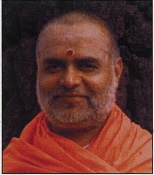By Sri Sri Sri Balagangadharanathaswami
In 1993 in Chicago, The Parliament of the World’s Religions met again, 100 years after the first such meeting in 1893. Then Swami Vivekananda made his historic speeches to America, planting the seeds of Hinduism in the USA and lighting the fire of the Hindu Renaissance upon his return to India. The 1993 meeting was another historical gathering, an international congregation of religious leaders from all over the world meeting with the common objective of imparting the values of dharma to their devotees. I went there to convey the dharmic thoughts and values of India and to spread this message. Now I understand that the organizing committee for the Parliament of the World’s Religions is working to hold another such parliament at the end of 1999, in South Africa. This is a difficult task and I would take this opportunity to share some insights on the significance of the Parliament’s goals.
The Parliament in 1993 brought together religious leaders representing different sects and countries, along with their respective cultures. There were 600 world spiritual leaders and dignitaries who gathered to share their path among over 6,500 participants–more would have come but the facility’s capacity was exceeded. People from every continent were present. Each representative made a comprehensive presentation of his thoughts on dharma. The result was an unprecedented exchange of information and knowledge relating to various cultures and religions. This gave an opportunity to learn about the other dharmas rather than thinking only of our own, opening everyone’s eyes to the commonality between all dharmas.
Certain values were common to all. Universal brotherhood, love for mankind, understanding one another and developing a humane outlook were shown to be essentials of all dharma. Every religion has values that can elevate man to higher levels of spirituality. All religions teach mankind to live his full life in contentment and happiness and to tread a path that could lead him to God–this is what I realized. This was an important message to the world. It is often written about and talked about, but at the parliament it became a reality.
So many religious leaders from different faiths were brought together. A significant awareness resulted, a realization that no religion was greater than another–all of them are great in their own right and have a religious appeal to their devotees. Understanding the values of all the religions and treating them with equal respect is one way of showing the greatness of our religion.
So, it is important that such parliaments be organized from time to time. This is one way of reaching out to the people and bringing solace into their lives. Today’s media is one which does not give peace to the people–it has all the ingredients to devastate the minds of our youth. Even adults will have to turn their heads away in shame and embarrassment at some television programs. TV has become a compulsion, influencing people towards violence. Scientists have done many studies to prove that violence on television, in movies and in video games make youth prone to real violence. Youth are being led to bad ways, onto a path to frustration. They seek momentary happiness by taking to drinking, smoking and drugs. The media is feeding them on such stuff.
The time has come for people to turn towards religion–to visit the temple, mosque or church and seek spiritual solace there, to make their life purposeful, to spend their life in happiness, living in the thoughts of God. Dharma is the only path. To counter modern negative influences, great meetings of religious leaders, dharma sammelans (congregations for righteousness), are essential. These have been held regularly within the Hindu world for thousands of years. They have the potential to inspire the world.
The 1993 Parliament was a new experience for many of the people who participated. But six years ago times were different. Since then, things are changing rapidly. Many events have taken place. Participants have gained more experience, faced different situations, had more interaction with people, learned new lessons. The agenda then may be irrelevant today. Now the need is to reach out to touch the lives of people and inculcate in them dharmic values. The next parliament should bring together more religious leaders who can share and discuss these issues in the interests of humanity.
There is always room for improvement. For example, the 1993 souvenir publication produced after the Parliament, which contained the speech of Swami Vivekananda, was released by the Catholic Pope, but only a few participants were able to receive copies. We have not received this publication in India. Religious leaders should attend who are knowledgeable, well read and have great vision. It is not enough to only invite those few who have a name, even lesser known religious leaders must be given an opportunity to participate in these parliaments. The Parliament should benefit the people. That is its purpose.
His Holiness Sri-La-Sri BalaGangadharanathaswami, 54, is the 71st Peethadipathi of Karnataka’s ancient Adichunchanagiri Mahasamsthana Math, 110 kms. west of Bangalore, perhaps South India’s largest monastic institution. An indefatigable worker, since taking the seat of abbot in 1974 he has modernized the work of both the monastery and his large congregation of grihastha devotees. The result is a dynamic and extensive Hindu mission comprising hospitals, educational facilities at all levels, schools for the blind, hostels, orphanages, shelters for destitute women, programs and centers that serve dharma to millions throughout the state.
